KEEPING OUR EYES ON THE PIES
FERGUSON, MO
WE-Making is a suite of resources that explores the relationship between place-based arts practices and social cohesion as a means to advance health equity and community wellbeing. This We-Making story is one example of how place-based arts and cultural strategies uniquely contributed to social cohesion and wellbeing in this community. Throughout this story you’ll see terms paired with actions in parentheses (e.g., social capital, collective action, place attachment, civic engagement, self-determination of shared values). This is to denote for the reader how the WE-Making framework was specifically incorporated. Explore the WE-Making framework and resources.
Image credit: Sweet Potato Comfort Pie
Sweet potato pie is what I consider to be the “sacred” dessert of Black culture and it has an amazing comforting effect. The murder site of Mr. George Floyd in Minneapolis is located only two blocks from what was my father’s home for over 30 years. NBC Nightly News reported my sharing sweet potato pie to people as “feeding souls one pie at a time.”
Responding to community pain by baking sweet potato pies began in 2014 when I felt compelled to do something after the killing of young Michael Brown in Ferguson, Missouri. My response to this inner-soul calling was to bake 30 sweet potato pies and personally take them down to a community where people who looked like me projected utter hopelessness on my television screen. I wept. My daughter Roslyn, who is a pastor, wrote a beautiful poem that I placed with each pie and my son Adam accompanied me on this journey.
As an artist, I easily recognize and respect how cultural food has historically been an artistic medium that heals and comforts community. A key awareness that evolved for me in Ferguson, was the stories people shared so freely when I would offer them a pie. I’ll always remember young Brittany Jones, who grew up with Michael Brown, standing at the make-shift memorial in the middle of the street where Michael’s body had laid in the summer heat for four hours. I heard her shouting out, “I wish you would have just been inside, and you’d still be alive!”
I introduced myself to the emotionally wounded girl, asked her how she had known Michael, and offered her a pie. Her reaction was surprise until she actually saw the pie. “It smells so good and it looks so pretty,” she whispered. Then immediately she fell into my arms and cried. A few days later she emailed me how much she and her family enjoyed the pie. “It brought me joy,” she said.
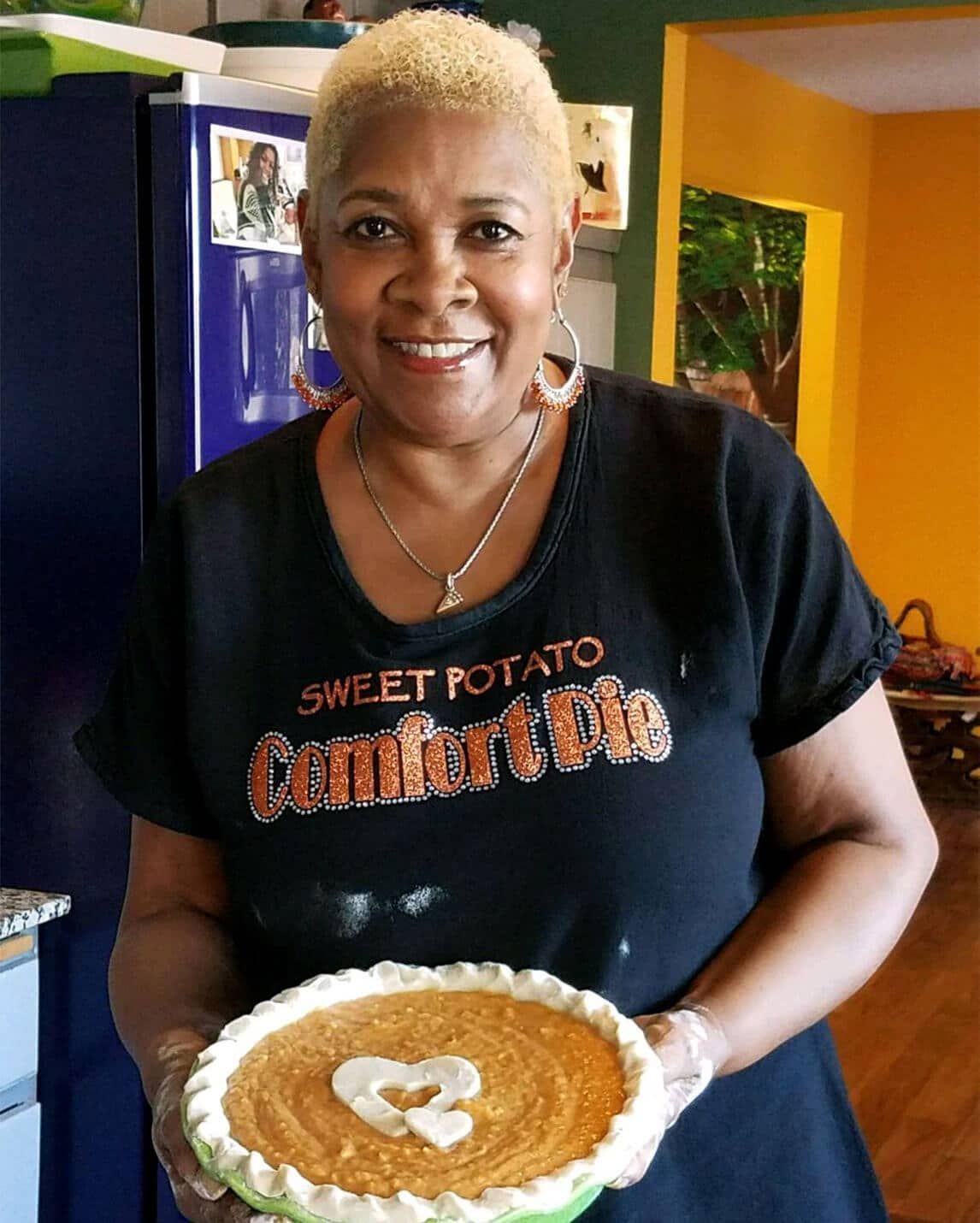
Little did I know that Ferguson was the beginning of what we now call, “keeping our eyes on the pies.” A few months later I found myself responding to the horror of 13 African Americans shot and nine of them died during Bible study at Mother Emanuel AME Church in Charleston, South Carolina. I organized over a dozen volunteers in Minnesota who baked 86 pies. We shipped 54 to Charleston and sold the remaining pies to assist with raising funds for shipping. A Jewish colleague, Eden Bart traveled with me (always important to have a witness). We served the pies to over 150 people attending the Wednesday night Bible study from all over the world in the same room where the senseless killings had occurred only a few weeks prior. People were there in solidarity against this ugly act of white supremacy (creative responses to trauma and racism). Eden and I were overwhelmed by the positive reactions from family members of the victims, by members of the church, visitors, and by the community of Charleston. USA Today’s coverage of the pies expanded nationwide, and our efforts became labeled as a mission, a movement, a ministry… through a pie.
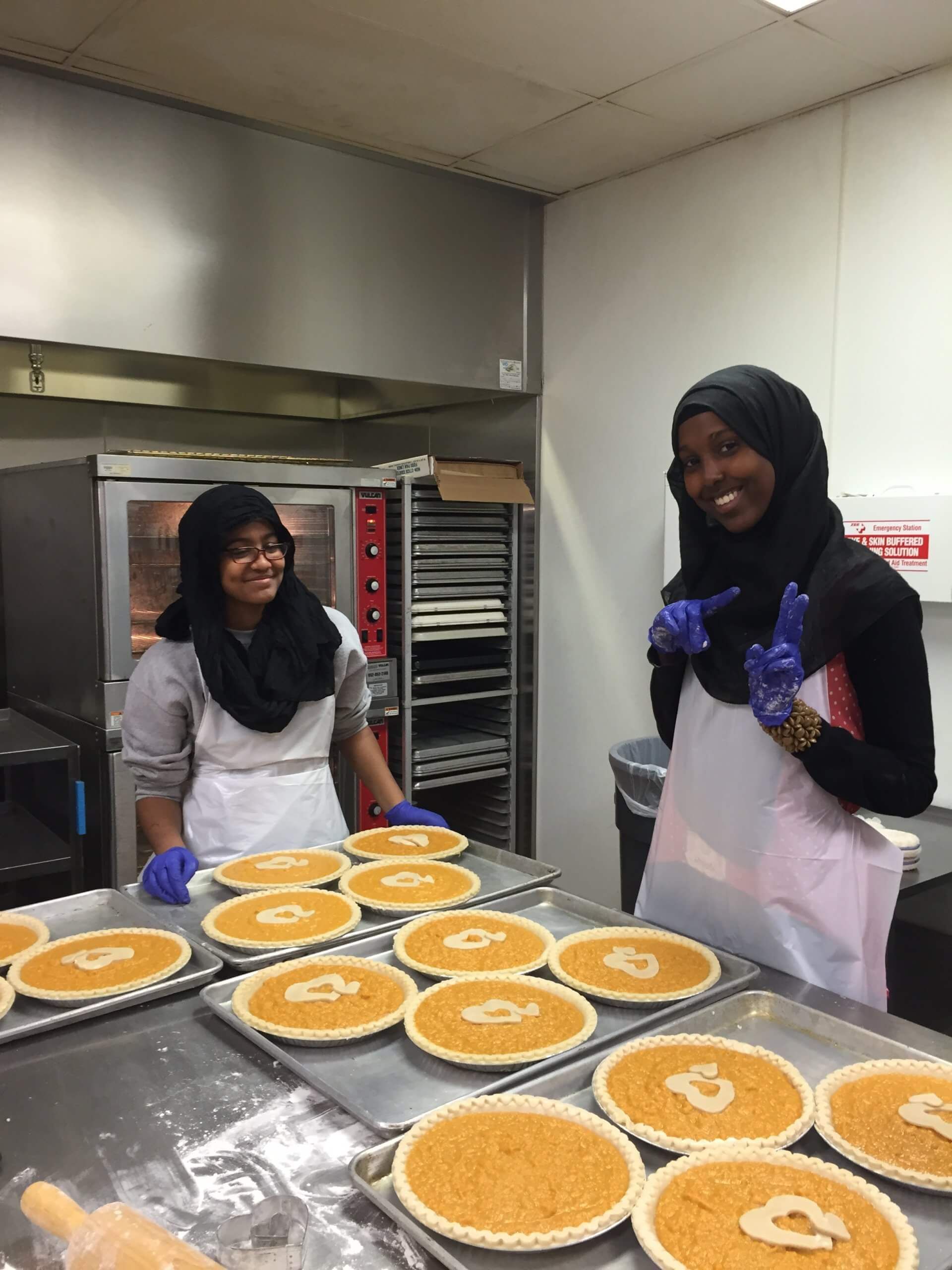
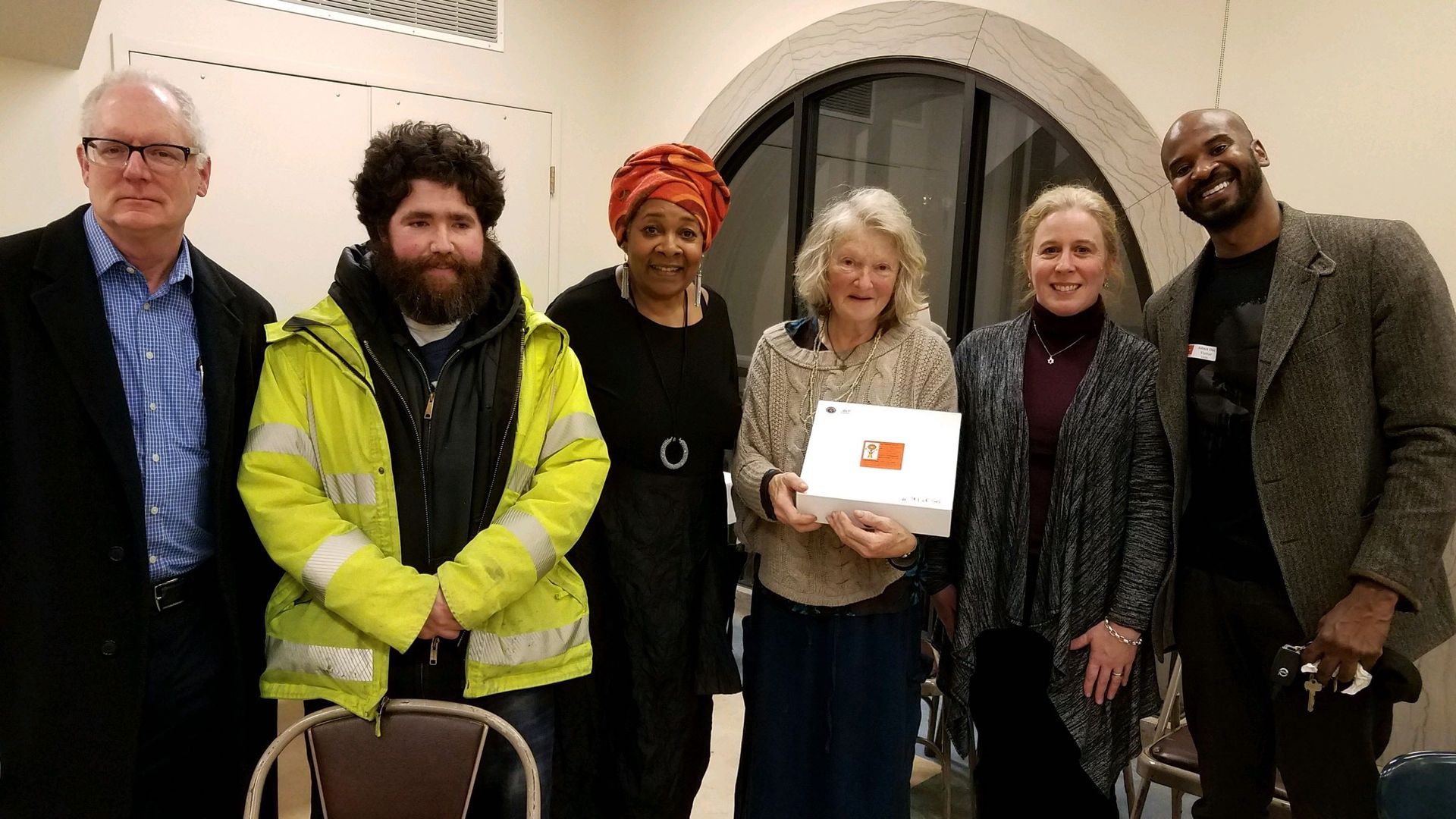
A few months later came the attack on worshippers at the Tree of Life Synagogue in Pittsburg, Pennsylvania. I baked pies with students at the Heilicher Jewish Day School in St. Louis Park, Minnesota. The children made poems to go inside each of the 50 pie boxes and the Rabbi blessed and then sealed each box. Wendy Goldberg, Assistant Education Director at the school organized communication with the Jewish leaders in Pittsburg and we traveled together to Pittsburg where we served and presented pies to families of victims. We also made an unplanned stop to a low-income housing complex in East Pittsburg to carry a pie to the mother of 17-year old Antwon Rose. Antwon was another unarmed Black male killed at the hands of police in 2018. His mother said she could feel the pie giving her comfort for what she and her family were about to face – the trial of the officer who killed her son – her child. Sadly, no justice was served for Antwon, but his family and community continue to fight.
The uncensored inhumane nine minutes and 29 seconds murder of Mr. George Floyd captured on video by 17-year-old Darnella Frazier left many of us in this world traumatized. Protests and riots erupted and curfews were enforced. How were we to breathe after witnessing what was initially reported as “Black man dies of pre-existing causes?” Had it not been for Darnella’s action to “do something and do it now,” the killing of yet another unarmed Black man would have been the same scenario of injustice.
Being forced to stay indoors and deal with COVID isolation was stressful, so I invited people to join me online to bake sweet potato pies and meet the next day outside my home at 6pm to take the pies to what has become known as “The George Floyd Square.” Imagine my surprise seeing a line of about 15 cars in front of my home with people and their pies. This further deepened my understanding of how connections happen by honoring and caring, especially when giving people something to do that’s positive in response to hatred and pain (self-determination of shared values- helping neighbors of different backgrounds recognize similar goals). This is healing in action on so many levels.
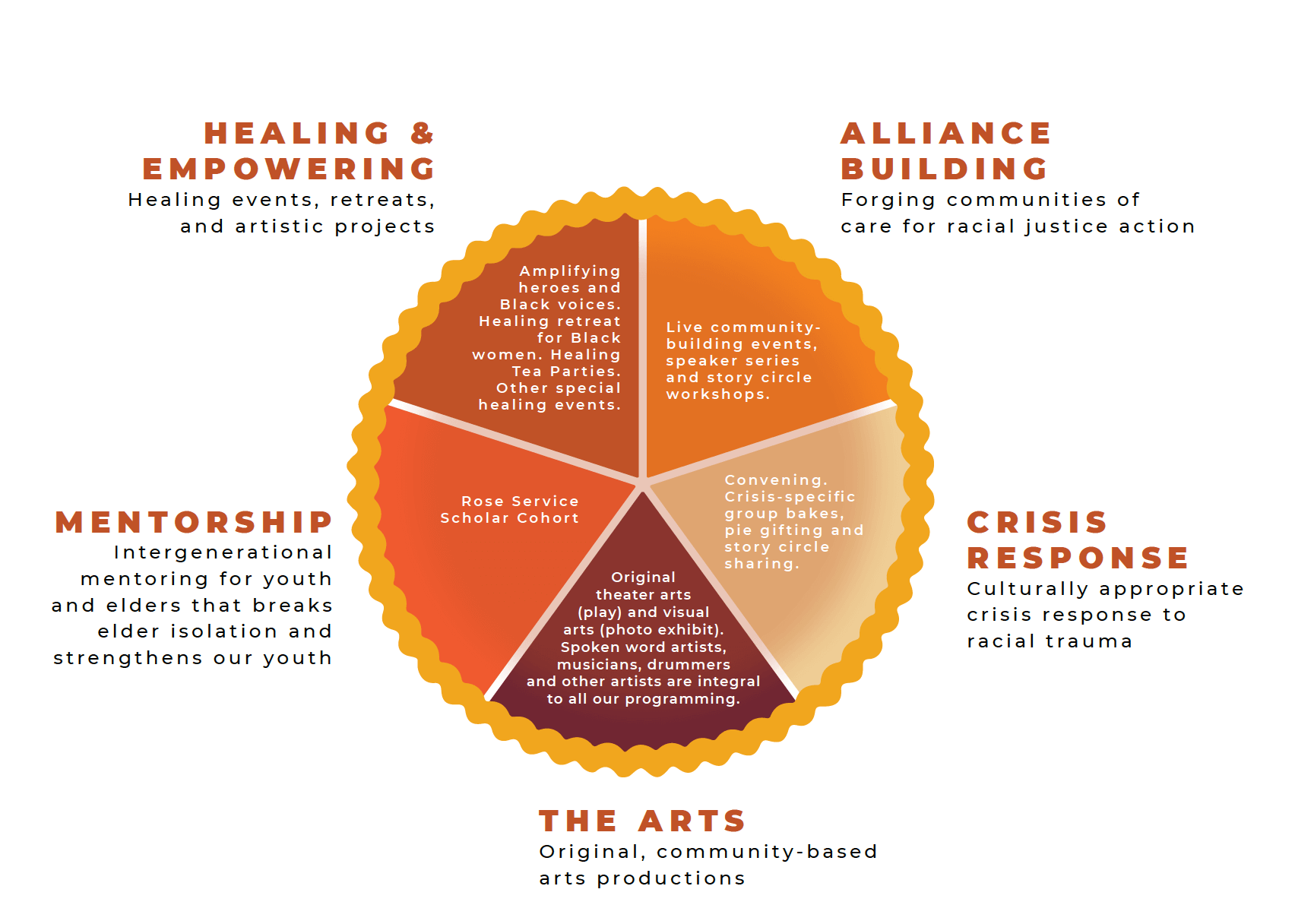
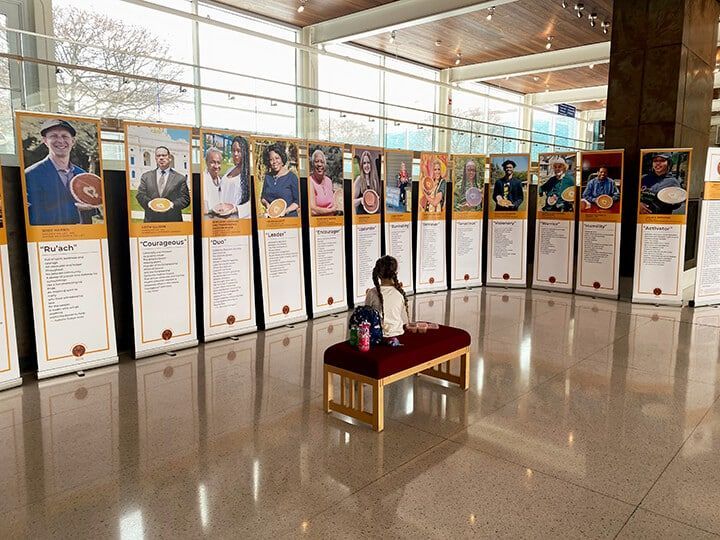
Where does my hope spring from during such painful times? From the youth, students, and educators. As teachers struggle with how to address social justice, some are reaching out to me for leadership in baking with their students and sharing what we call “Pie-Dentity.” This story circle activity allows people to examine their own understanding of race relations and other issues of concerns (social capital- bonding). The top two concerns for students tend to be bullying and racism.
The sixth-grade students at Nobel Middle School in the Bloomington, Minnesota bake Sweet Potato Comfort Pies, then take donations from staff, parents, etc. for each pie. The funds collected are donated to a local homeless shelter as winter approaches as COVID makes it so that they can no longer do a warm-clothing drive.
Students in Family Consumer Science classes at Hopkins West Middle School have baked for the second year in observance of the anniversary of Mr. George Floyd’s death. Meanwhile, the Robbinsdale Area School District’s Child Nutrition staff conferred with me on how to make the pie and now planning their second year of serving sweet potato pie across the entire school district in honor of Black History Month (celebration and preservation of culture). A private school in the area – Breck, had me speak to every class K-12 and share my story encouraging the students to “find their own purpose.” In November 2022, three college students including one PhD candidate, interviewed me on what it takes to become an activist in community.
Why this pie? As I often say I did not call the pie – it called me. I don’t even care for cooking! Yet, as mentioned in my TEDx Talk in 2011, there is “Power in Pie” In 2021, The Japanese Press featured the Sweet Potato Comfort Pie story as one of the top 50 Positive Stories in the World. Since Ferguson, more than 4,000 Sweet Potato Comfort Pies have been made by volunteers, student groups, and social media participants locally, nationally, and internationally.
As we prepare for the 9th Annual Martin Luther King, Jr. Holiday of Service which evolved after my journey to Ferguson, it warms my heart to see how our volunteers have grown from 13 people to well over 250 (civic engagement- willingness to participate, orientation toward the common good). In 2023, 94 pies will be baked (the age Dr. King would be if alive). The pies will be gifted into the communities based upon the stories people share in small groups of who they feel should be recognized.



